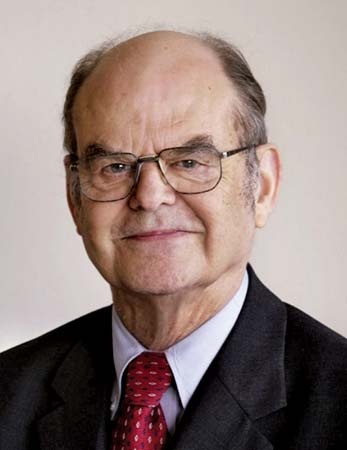Thompson, John Griggs
American mathematician
born October 13, 1932, Ottawa, Kansas, U.S.
 American mathematician who was awarded the Fields Medal in 1970 for his work in group theory (group). In 2008 the Norwegian Academy of Science and Letters awarded Thompson and Jacques Tits of France the Abel Prize for their “profound achievements in algebra and in particular for shaping modern group theory.”
American mathematician who was awarded the Fields Medal in 1970 for his work in group theory (group). In 2008 the Norwegian Academy of Science and Letters awarded Thompson and Jacques Tits of France the Abel Prize for their “profound achievements in algebra and in particular for shaping modern group theory.”Thompson earned a B.A. from Yale University in 1955 and a Ph.D. from the University of Chicago (Chicago, University of) in 1959. After a year at Harvard University (1961–62), he returned to the University of Chicago (1962–68), and he subsequently moved to Churchill College, Cambridge, England.
Thompson was awarded the Fields Medal at the International Congress of Mathematicians in Nice, France, in 1970. His work was largely in group theory. In 1963 he and Walter Feit published their famous theorem that every finite simple group that is not cyclic has an even number of elements—a proof requiring more than 250 pages. Because every finite group is made up of “composition factors”—building blocks that are finite simple groups—theorems about simple groups have ramifications for all finite groups. The subsequent work that resulted in Thompson's receiving the Fields Medal was the determination of all the minimal simple finite groups—that is, those groups all of whose proper subgroups are built only of cyclic composition factors. Thompson's revolutionary ideas inspired and permeated an effort, hitherto considered hopeless, to determine all the finite simple groups. The solution of this problem, the so-called “Enormous Theorem,” was announced in 1981 and represents the combined efforts of hundreds of mathematicians in separate journal articles consuming well over 10,000 pages. Thompson made further contributions to Galois theory, representation theory, coding theory, and, working on the proof of the nonexistence of a plane of order 10, the theory of finite projective planes.
- Greer, Germaine
- gregale
- gregarine
- Gregg, John Robert
- Gregg shorthand
- Gregg Toland
- Greg LeMond
- Greg Louganis
- Greg Maddux
- Gregor Aichinger
- Gregoras, Nicephorus
- Gregori Aleksandrovich Margulis
- Gregorian calendar
- Gregorian chant
- Gregorian Reform
- Gregorian University
- Gregorio Hernández
- Gregorio López y Fuentes
- Gregorio Martínez Sierra
- Gregorio Ricci-Curbastro
- Gregorios Akindynos
- Gregor Mendel
- Gregor Strasser
- Gregory, Augusta, Lady
- Gregory Bateson